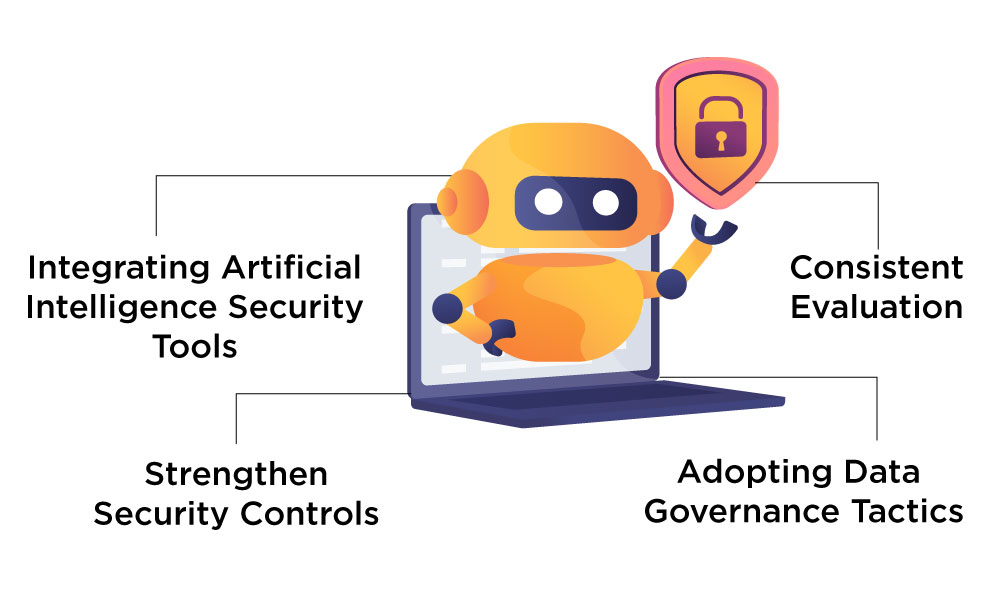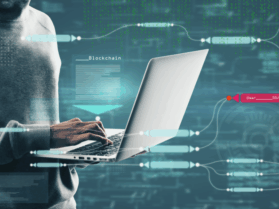Artificial intelligence has observed significant integration and progression in several domains, including finance, marketing, manufacturing, healthcare, and others. Alongside bringing efficiency in these industries, AI has brought significant risks, such as data control and theft. While eliminating such risks, it is crucial to aim for secure AI implementation and usage.
As experts state, 80% of businesses have incorporated AI globally. Surprisingly, 77% of them have gone through data breaches for such incorporation. So, how do we use AI safely and ensure data protection, and how can such an approach be beneficial?
Here is an explanation...
This blog explores secure AI usage and its importance, alongside discussing the key AI security practices.
What is Secure AI or AI Security?
Secure AI denotes the process of safeguarding valuable data and information from different risks while using artificial intelligence. In simple words, AI security ensures safe and compliant usage of artificial intelligence that protects users from losing or exposing their personal data to illegal sources. Additionally, the process also ensures the ethical utilization of AI.
AI has indeed transformed the commercial setup by bringing efficiency, streamlining workflow, and saving valuable time of companies. Nevertheless, such implementations trigger significant threats of data breaches. As a result, companies can end up losing their valuable resources and confidential information. Moreover, machines are not 100% risk-free due to the possibility of software and hardware failure.
Considering such risks, businesses are investing in AI security to ensure a safe transition to AI practices. As a result, the artificial intelligence security industry is progressing significantly.
Importance of Secure AI Usage:
With the increased technological transformation, cyber threats have also heightened. Cybercriminals are continuously finding new ways to steal and utilize user data illegally. Under such circumstances, AI implementation can be a gateway for criminals to steal user information.
AI entirely depends on machine learning models and the consistent presence of the internet to assist humans in simplifying their tasks. In case of any weaknesses in the ML algorithms and internet connection, cybercriminals can easily access confidential user data. Aside from that, it is also essential for users to ensure the ethical usage of AI and stay compliant with the privacy policies of different regions.
Artificial intelligence can be misleading, provocative, biased, and insensitive, creating danger for users. AI security looks after all these factors, assuring effective, risk-free AI usage. Below are a few benefits of secure AI utilization:
Effective and Fast Risk Identification: Artificial intelligence processes large amounts of data while offering assistance to humans. Adopting AI security measures enables users to detect threats faster and more effectively, safeguarding datasets from threats.
High Operational Efficiency: Companies utilize artificial intelligence to streamline their operations and workflow. So, when any security risks take place, businesses can encounter major operational failure. Secure AI usage can eliminate such drawbacks, bringing efficiency to operations.
Positive User Experience: Artificial intelligence intends to assist humans in their tasks; hence, user experience is significant here. AI security ensures increased user experience alongside sustaining safety measures.

Top Secure AI Practices:
Integrating Artificial Intelligence Security Tools:
There are various AI security tools that provide threat intelligence services following AI implementation. Such tools enable users to identify security risks in AI models, ensuring maximum security.
Strengthen Security Controls:
Security control methods include encryption, multifactor authentication, and others. These tactics safeguard AI tools and platforms from threats, authenticating people with permission to access the tools.
Adopting Data Governance Tactics:
Data governance methods let artificial intelligence systems understand how and to what extent data should be leveraged. It directly contributes to effective threat management, empowering AI tools to limit and protect data from increasing risks.
Consistent Evaluation:
A superior practice of secure AI usage is continuous monitoring and assessing. Organizations need to consistently track and evaluate the performance of the AI tools they have installed. Such an approach allows users to identify weaknesses and fix them effectively.
Summing Up!
Vulnerabilities in AI systems can increase the possibilities of several privacy threats, such as data breaches, unethical deployment, AI model failure, adversarial threats, regulatory issues, and others. These situations can create problematic situations for businesses following the integration of AI tools, causing operational and financial losses. Therefore, aiming for secure AI utilization is necessary.
Read our articles and stay up to date with the latest cybersecurity practices!
Read More: Cybersecurity in 2024: Emerging Trends and Strategies





